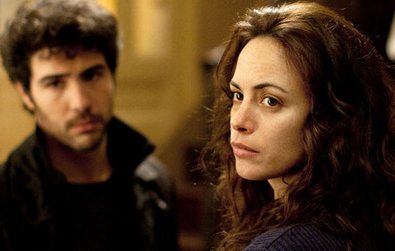Daniel
Charchuk has been reviewing films for Arts & Opinion
since 2012. His favourite films include Stanley Kubrick's
2001: A Space Odyssey, Ridley Scott's Blade Runner and Steven
Spielberg's Jurassic Park. When not watching or reviewing
movies, he can usually be found reading science fiction
or playing video games.
It
is telling that the opening scene of The Past,
Iranian filmmaker Asghar Farhadi’s follow-up to his
Oscar-winning A Separation, unfolds without any
audible dialogue: as Ahmad (Ali Mosaffa), a soft-spoken
and bearded Iranian man, arrives in Paris on a flight from
Tehran, he discovers that  his
luggage has not survived the flight; meanwhile, his (soon-to-be)
ex-wife Marie (Bérénice Bejo), waiting for
him behind a soundproof glass partition, attempts to communicate
with him through exaggerated hand gestures and facial expressions.
Though seemingly little of narrative consequence happens
here, its underlying themes of missed connections and fractured
communication craft a thematic framework that will inform
the remainder of the film.
his
luggage has not survived the flight; meanwhile, his (soon-to-be)
ex-wife Marie (Bérénice Bejo), waiting for
him behind a soundproof glass partition, attempts to communicate
with him through exaggerated hand gestures and facial expressions.
Though seemingly little of narrative consequence happens
here, its underlying themes of missed connections and fractured
communication craft a thematic framework that will inform
the remainder of the film.
Like
Farhadi’s previous work, the plot of this film unravels
in a careful and hierarchical manner, with the writer/director
utilizing his impressive penchant for compelling, naturalistic
dialogue to reveal unexpected story developments incrementally.
As such, it is difficult to encapsulate the narrative without
giving too much away; in summary, Ahmad has returned to
France after four years away to finalize his divorce from
Marie, a French woman to whom he was married for several
years and who also has two daughters from a previous marriage.
When he arrives in Paris, he discovers that she is now living
with another man, Samir (Tahar Rahim), and his young son,
making for a highly tense and uncomfortable domestic situation.
Eventually, recent history is dredged up and shocking prior
events are brought to life, giving the film its title and
the narrative its action.
This
early revelation is only the first of several over the course
of the film, each of which ups the ante in terms of surprise
and significance. But do not mistake Farhadi’s plot
for one of multiple narrative twists and turns; his structure
is much more straightforward and streamlined. This does
not mean his screenplay is simple or uncomplicated, though;
merely that it forgoes the over-complexity of so many modern
thrillers in favour of something cleaner and more organic.
In fact, Farhadi’s use of melodrama – itself
a deceptively simple dramatic form – to slowly unveil
elements of the secret at the plot’s core, while also
peeling away various characters’ entangled motivations,
is intricate and masterful, speaking to the filmmaker’s
command of his craft and singular vision. In many ways,
this is a mystery movie disguised as a melodrama –
or perhaps, depending on your viewpoint, vice versa.
However,
Farhadi’s intentions with this film are not so cut-and-dry.
As in A Separation, which also used the camouflaging
cloak of melodrama to subtly comment on and critique the
Iranian state, The Past’s underlying message
may be lost underneath the aforementioned narrative mystery
and character drama. It is perhaps important to note that
Farhadi, like his compatriots Abbas Kiarostami and Mohsen
Makhmalbaf, chose to relocate to France for the production
of this film, seemingly to escape the controversy and censorship
of the conservative Iranian government. And though his film
is not overtly political or outwardly critical, it does
have quite a lot to say on the cultural differences between
the East and the West, specifically with regards to gender
roles in each.
There
is a short scene between Ahmad and Marie, perhaps a third
of the way into the plot, which seems to expose this divide.
Marie is explaining where she met Samir, and Ahmad, finding
something amusing, smiles briefly; Marie takes this for
a mocking sneer, and asks him derisively why he would do
so; Ahmad explains it is simply a cultural difference. Though
concise in length, and practically insignificant to the
main narrative, it does seem of vital importance to Farhadi’s
main thesis: that disparities between cultures have a way
of exaggerating trivial problems and leading to ruptures
in relationships, personal or otherwise. Though never explicitly
stated, it is implied that the ‘past’ of the
title refers not just to the characters’ personal
histories, but the relatively recent events of the Iranian
Revolution, which essentially severed the country from the
West and left it separated, divided by a metaphorical glass
partition, unable to communicate or connect with anyone
on the other side.